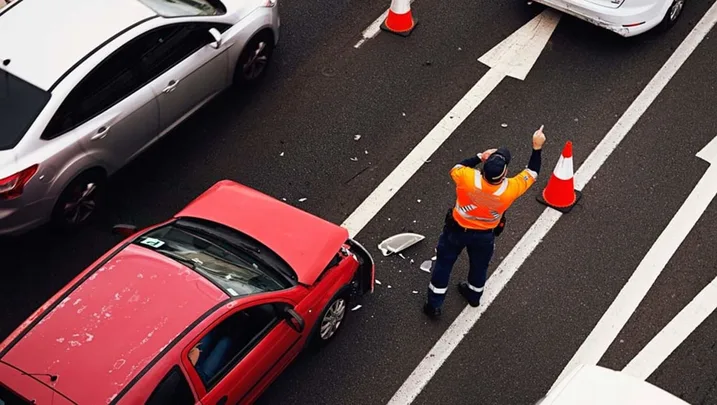The one merciful thing about car accidents is that they’re over very quickly, no matter how long your time-dilating brain may later trick you into thinking they lasted.
What can take far longer, and be almost as painful in terms of mental suffering, is the car insurance claim process.
No one wants to get a lot of practice at motor vehicle accident claims, and it probably doesn’t get any more enjoyable if you do, but it is clearly a case where being forewarned is being forearmed.
Should the worst happen and you’re involved in a crash, regardless of who’s at fault, knowing the procedure beforehand, and what to do and not do, could save you time, and lots of money.
So let’s start at the beginning of the car accident insurance claim process – those vital, and often scary, moments straight after the collision occurs.
I’ve crashed – what do I do?
In the words of the famously helpful Hitchhiker’s Guide to the Galaxy, Don’t Panic. Emotions may be running high, on one side or both, or only on one side if it’s a single-vehicle accident and you’ve implausibly collided with an immovable object.
“Try and adopt a Zen-like attitude of being calm, and leaving the apportioning of blame to the experts.”
We’ve previously published a helpful article on what to do in the immediate aftermath of an accident, but in summary, the essential thing not to do is admit fault, no matter what’s occurred.
It’s also a good idea not to inflame tensions by accusing the other driver of being at fault. Try and adopt a Zen-like attitude of being calm, and leaving the apportioning of blame to the experts.
Speaking of which, it’s important to consider whether to contact the police, if they haven’t already turned up. Legally, there’s only a need to do so if there is property damage; meaning cars other than yours or fixed objects, like street signs, that might need fixing or replacing.
You should also call the authorities if there’s a need for police to redirect traffic, or if there’s any suspicion of drugs or alcohol being involved in the crash. If you do contact them, make sure you are given a Police Event Number, to aid with your claim.
Regardless of whether the cops are coming, you need to act like one yourself. It’s important to collect evidence and details, and to take photos of the scene; a job made far easier by the advent of the mobile phone.
Speaking of which, it maybe worth downloading an app – just in case – like the Claim Assist offered by AAMI – so you have a checklist of what to do with you at all times.
The information motor vehicle accident claims insist that you collect at the scene includes the name, address and registration details of the other car involved, and the name and address of the owner of the vehicle, if it is not the driver. Get the name of their insurer, too, for good measure.
If anyone refuses to exchange their details, call the police. And tell them you’re doing so.
Be sure to note the time of the accident, where it happened, and what the traffic, lighting and weather conditions were, because they might have contributed to the collision.
Basically, the more details you have, the better, and if you can get any witnesses to give a statement at the time, do so, because people tend to forget details if they’re asked days, or weeks, later.
Drawing a diagram of the accident will come in handy when you get to Form Time.
How to make a car insurance claim
The good news, as you look at the crumpled and depressing remains of what used to be your beloved vehicle, is that everything will be fine, eventually, particularly if you are insured.
Obviously, you can claim against your own insurance in the event of an accident, but remember that you don’t have to, and should carefully consider whether you want to.
As Legal Aid NSW points out, “It’s your choice. If you make a claim, you may have to pay an excess if you are at fault and may lose your no-claim bonus.”
As absurd as it may seem, after paying your insurance premiums and never getting any return, life is weighted towards insurance companies – they didn’t get rich by accident – and you may be better off financially if you don’t claim, depending on the extent of the damage.
Obviously, if the repairs are going to cost less than your excess, you shouldn’t claim. Call your insurer, by all means, and discuss your options.
There are two types of insurance – Comprehensive (which covers damage to your car as well as other cars and any other property that’s been damaged) and Third Party Property Insurance, which generally only covers the damage you’ve done to a third party; i.e. other people’s cars or property.
As Legal Aid helpfully points out, if the other driver is at fault and not insured – and this is a worst-case scenario – you can also claim (up to around $5000) for damage to your car “under the little known Uninsured Motorist Extension (UME) terms of your Third Party Property policy”.
This is a question about third party insurance claims that very few people know to even ask.
Again, it is vital to discuss the accident with your insurers before you admit any responsibility or enter into negotiations with other parties.
At this stage, your insurer will start sending you forms, some of which may feel slightly longer than the Bible.
These forms will always ask you to draw diagrams, which is why doing one at the scene of the accident is a good idea. If you’re not good at drawing, get someone to help you, because this can cause more delays down the track, when the insurer contacts you to ask you what the hell is going on in yours, and whether you’ve ever played, or won, a game of Pictionary in your life.
Quote, and quote again
It will probably come as the smallest surprise of all time to hear that not all mechanics are the same, and nor do they all charge the same for repairs.
You’ll need to get a quote from a smash repairer to find out how much it’s going to cost to fix your car, but it’s worth getting more than one, for the sake of comparison.
If the cost of fixing your car is more than the price of replacing it, then you have a write-off on your hands, in which case you should feel lucky to have survived. And possibly excited that you’re about to get a new vehicle.
At this point you need to get a report on the pre-accident value of your vehicle, less the worth of any salvage value.
Your insurer – or a motoring organisation like NRMA, or RACV, RACQ etc – may be able to help you with this, and if not you’ll need to contact a loss adjuster or valuer, using good old Google.
Keep in mind that you may also be entitled to compensation for other costs, like towing fees, loss of belongings that were in the vehicle or the hire of a replacement vehicle while this process is ongoing (see below).
Read your insurance documents in detail and remember the golden rule – if you don’t ask, you don’t get.
Car insurance claims not my fault
If you believe the other driver was at fault, Legal Aid recommends you write a letter of demand, asking them to pay for your car and other costs.
“Attach a copy of the quote. Ask the other driver to respond within a specific time, 14 days for example. Keep your original quote and a copy of the letter,” they advise.
On the other hand, if you receive a letter of demand, you should respond. If you disagree with the claim about who is at fault, explain your position, and if you disagree with the costs that are being proposed, dispute that as well, by obtaining quotes of your own.
Be sure to write “without prejudice” at the top of any correspondence, so they can be used as evidence if, heaven forbid, you later end up in court.
Can you get a rental car while yours is being fixed?
If you’ve managed to walk away from an accident uninjured, but your car is off the road, the biggest pain you’re going to suffer, even worse than the form-filling and phone calls, is the inconvenience of getting around without wheels.
Worst case, you may have to endure public transport.
The good news is that if you are comprehensively insured with a reputable company, they are likely to offer you a hire car for your use in the interim. As always, if they don’t offer, be sure to ask, and if they say no, ask why not.
If the accident isn’t your fault, then you should be able to claim the costs of hiring a car against the other party’s insurance.
Insurance companies don’t often advertise these things too clearly, but court cases in Australia have established that, if you’re the driver who’s not at fault, you should be able to recover this cost while your car is being fixed. All you need to do is establish a “reasonable need” for a replacement vehicle, like the fact that you need one to get to work.
Courts have previously ruled that car-hire costs were a reasonably foreseeable consequence of a car accident and therefore a recoverable cost.
Car insurance claim time limit
While on the one hand it seems unlikely that anyone would want to take their time over a car insurance claim, minor bingles and people not wanting to pay can drag on.
Legal Aid NSW advises that time limits are effected by the type of claim you are making and that because every case is different it’s vital to talk to a lawyer as soon as possible, if you’re worried that nothing is being done.
There are also time limits that apply to things like your Police Event Number. If the accident is one that needs to be reported to police, you must do so within 28 days, or you can be penalised.
Once your report is submitted you must obtain a Police Event Number, to prove the claim was made in a timely fashion.
If you’ve been injured in the accident you need to be assessed by a doctor as soon as possible after the incident, so that you can later claim costs.
This article originally appeared on CarsGuide.










